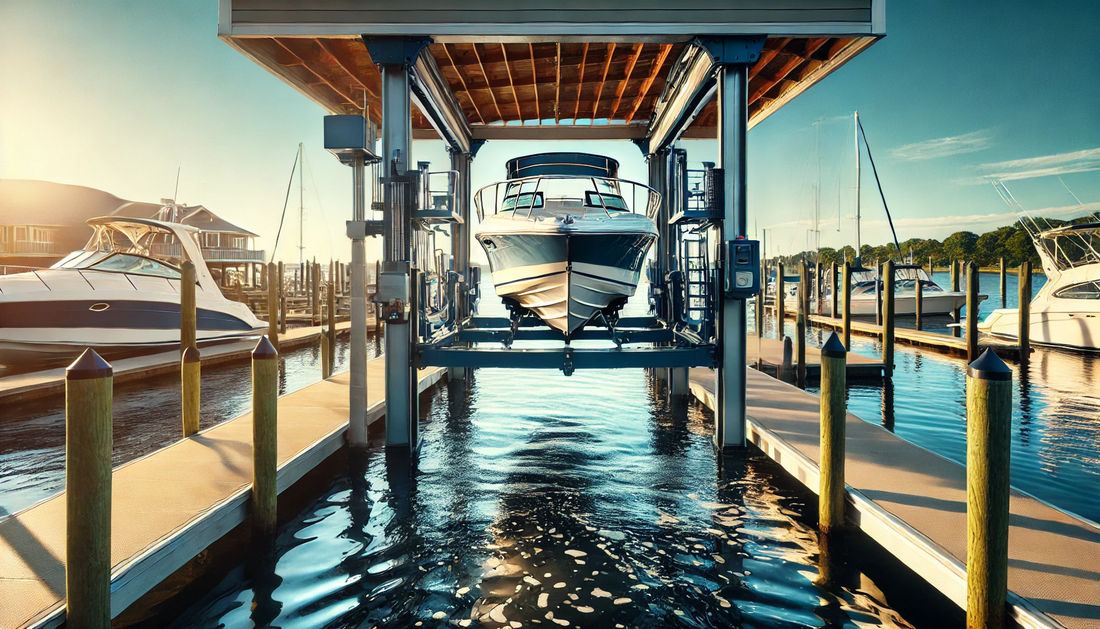Boat lifts are vital for protecting your investment by keeping your boat out of the water when not in use, preventing damage from prolonged water exposure. Proper boat lift maintenance ensures your lift operates smoothly and extends its lifespan. In this blog, we will discuss five essential boat lift maintenance tips to keep your boat lift in prime condition. Let’s begin!
Regular Inspection and Cleaning
Regular inspection and cleaning are crucial to prevent potential issues and ensure the longevity of your boat lift. Inspect the lift for any signs of wear and tear, rust, or corrosion. Check all the cables, pulleys, and other moving parts for any damage. Cleaning the boat lift regularly helps to remove debris, salt, and grime that can accumulate and cause damage. You can use fresh water to rinse off any salt and debris after each use, especially if you operate in saltwater environments. This helps to prevent corrosion and buildup.
Lubricate Moving Parts
Lubrication is essential for maintaining the smooth operation of your boat lift. Over time, the moving parts of your boat lift, such as the pulleys and cables, can become dry and create friction, leading to wear and tear. For the boat lift winch maintenance ensure that the winch gears and other moving parts are well-lubricated.
Firstly, remove dirt, salt, and debris that can accumulate on the winch, especially after exposure to saltwater. Then, use a marine-grade lubricant to keep everything running smoothly. Regular lubrication helps to reduce friction and wear, extending the life of your boat lift. Also, ensure the winch is properly aligned to prevent uneven strain on the cables.
Check and Replace Cables
Cables are one of the most critical components of a boat lift. They bear the weight of your boat and are constantly under stress. Regularly check the cables for any signs of wear, fraying, or corrosion. If you notice any damage, replace the cables immediately to prevent potential failures.
Replace the cables every two to three years, even if they appear to be in good condition. Over time, cables can weaken and may snap unexpectedly, leading to costly repairs and potential damage to your boat.
Inspect and Maintain Electrical Systems
If your boat lift has an electrical system, regular inspection and maintenance are essential to prevent issues. Check all electrical connections for corrosion or loose connections. Ensure that the motor and controls are working correctly.
Regularly test the lift's electrical system to confirm everything is functioning correctly. If you notice any issues, such as the motor struggling or making unusual noises, have it inspected by a professional.
Off-Season Maintenance
During the off-season or winter months, it's essential to take additional steps to protect your boat lift. Winterizing your boat lift helps to prevent damage from freezing temperatures and prolonged inactivity.
Remove the boat from the lift and store it in a safe location. Lower the lift to its lowest position to relieve tension on the cables and other components. Cover the lift with a tarp or boat lift cover to protect it from the elements. For extreme weather locations, disassembly and removal of the lift may be prudent.
Additional Boat Lift Maintenance Tips for Long-Term Care
While regular DIY maintenance is essential, scheduling professional maintenance at least once a year can help to identify and address issues that may not be visible to the untrained eye. A professional can perform a thorough inspection, lubrication, and any necessary repairs or replacements. Choose a reputable marine maintenance company with experience in boat lift maintenance. Professional maintenance helps to ensure the longevity and safety of your boat lift.
Final Thoughts
By implementing these essential boat lift tips, you can keep your lift in prime condition and enjoy hassle-free boating experiences. Focus on regular inspections, boat lift cable maintenance, and seasonal preparations to prevent problems before they arise.

